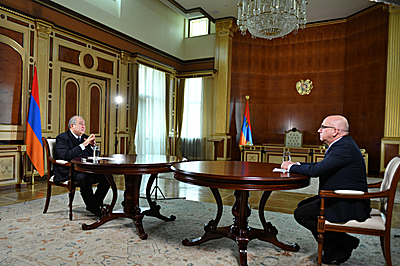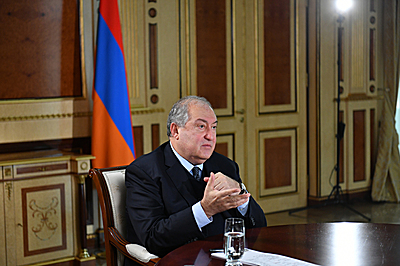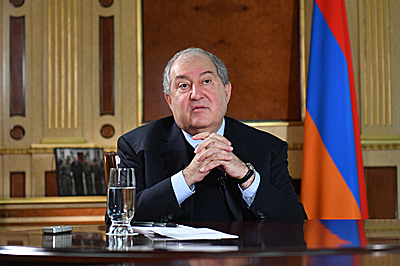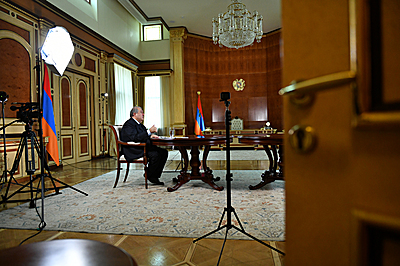Interviews and press conferences
Our main agenda should have two important components: reliability and predictability. An exclusive interview of President Armen Sarkissian to aravot.am website and "Aravot" daily (part 2)
President Armen Sarkissian gave an exclusive interview to aravot.am website and "Aravot" daily. Below, we present the second part of the interview.
Aram Abrahamyan: Mr. President, let me start talking about the current situation with an issue that, for some reason, is not discussed much these months, but I think it will be the most decisive in the next one or two years. The deepest and most sensitive crisis is in our economy, the economy is in a deep skid. What solutions do you see?
- I agree with you that the economy is experiencing a deep crisis, but, unfortunately, this is not the only crisis. To be honest, in reality, we live in a multi-vector, and multi-component crisis; we have not only a crisis, which is post-war, a crisis of losing most of Artsakh, a crisis of losing human lives. The loss of each person is a tragedy in itself, and when it comes to thousands of young people, it is truly a national tragedy.
It is a crisis because next to the loss of young people, there are their families who lost their best sons and are living in a deep crisis. It is a crisis because thousands of young people have been injured.
We have a health crisis because there is the Covid. I would like to appeal to your listeners and readers once again, urging them to be careful. Covid is not over, on the contrary, I think the second wave of Covid is coming to Armenia, and that wave is as dangerous, difficult and tragic for many people, as the first one. This should be taken very seriously. I see that the Covid numbers are growing in Armenia, and on this occasion, I recently had a serious conversation with several ministers, including the Minister of Health. But I think it is important for people to be more careful, because the number of people who died of Covid today is about the same as it was during the war. And that number continues to grow.
We have a social crisis as we have many unresolved social problems due to the war, as well as those existing before it. Besides, there are many families who came to Armenia from Artsakh and returned to Artsakh, who are in very difficult social conditions.
We also have a deep moral and psychological crisis. We feel that depth in the indifference of thousands of people, also in their indifference to the political processes. If in 2018, we could see 100, 200-300 thousand citizens on the streets, especially young people, today, it is distressing to hear that thousands of people are thinking of buying a ticket and moving to Russia, or getting a US visa. Emigration can reach crisis levels.
The moral-psychological crisis can be so deep that it may reach the crisis of identity. If six-seven months ago, we were a people who survived the Genocide and won the first Artsakh war, then after the second Artsakh war, many people asked the same question: who are we? And the second part of the problem called emigration is emigration within the Diaspora. In other words, people who were proud to be Armenians, felt involved in the problems of Armenia, are colder, avoiding, and cautious today. This poses deep dangers.
This list is quite large. We started from the economic crisis. You cannot offer a single solution to this crisis. To overcome a minor economic crisis, it is necessary for the state apparatus and the state to work efficiently, that is, for all state services to work effectively, which, unfortunately, I can say that we do not have today. We need clear discipline in the public service, in business, in all kinds of services, in the awareness that a lot depends on discipline. Unfortunately, we do not see that discipline even in the field of public service.
The state has many responsibilities. They are also social. The people, the citizens, have responsibilities towards the state, and the government, so that it ensures the security and borders of the Republic of Armenia, and the security, in general. When we say security in this case, we are talking not only about the border, territorial, and military-political security, but also about cyber security, in particular. In today's world, cybersecurity and information security play a huge role, both during the war and after the war, and can have a huge impact in terms of attracting investments to Armenia.
Food safety is also important. Let us not forget that Armenia has no access to the sea, it is blocked: Turkey, Azerbaijan, very small area with Iran and Georgia. Armenia, like any other country, even a large one, cannot be self-sufficient in the field of agriculture and food. Therefore, food safety is an important issue. In order to deal with food security, you must first acknowledge and realize that such security exists, and that is part of managing the economy. However, it is hard to imagine food security without modern agriculture, and we do not even have a Ministry of Agriculture today. Naturally, food security is not only a matter of agriculture, food production or reproduction, but also a matter of relations, international trade relations. In other words, we need to deal with this issue seriously.
Today, Armenia, under the most difficult conditions, is not the most attractive country in the world for investors. Investing here is already problematic for many, and even more so after the war. Therefore, we need to have new approaches and solutions that are not ordinary, and, of course, we need discipline, and daily hard work to make Armenia attractive to investors again. This is the case when the government, the public and the National Assembly must find non-standard solutions, starting with tax solutions that will encourage investment. I am sure this is possible based on my personal experience. I am sure there are countries and companies ready to make investments; this confidence is also based on my personal experience, and the friends with whom I communicate. But in every single case, we must do our best to make the investor feel that he has come to the right country. If you agree to invest, for example, in solar energy, and there is a willingness to invest in that sector, sums of hundreds of millions, but the discussing and licensing process takes, say, two years, how would you treat this, as an investor?
Aram Abrahamyan: Badly.
- If you are ready to invest $ 200-300 million, and ready to increase that investment to $ 1 billion, but in two years, you have not yet reached the point where the government says, well, please start tomorrow... It seems that everything should have been done to make these decisions very quickly, but if this takes a long time, Armenia is no longer attractive for either the investor or other investments related to that investor.
Therefore, how to overcome the economic crisis? The answer is through everyone's hard and disciplined work.
If after the Second World War, the Japanese made Japan one of the leading economic countries in the world due to their discipline and daily work, why can't Armenia repeat the same thing? This requires a clear plan, vision, daily hard work, and discipline. There is no other solution. Miracles do not happen. And by going that way, once more you prove to yourself, to all your people, and to the whole world that your victories are in the future, and those victories will come.
Aram Abrahamyan: Mr. President, let me use a fashionable word - "rejected". Perhaps, I am wrong, but in my opinion, Armenia is rejected by some of its friends and allies, and most importantly, our state is rejected by our citizens, and the Diaspora. Am I exaggerating?
- I think you are exaggerating. And I do not see anything strange in that, because for many of us today, the situation is really emotionally tragic and difficult. Many people go through a deep depression, so the feeling of being rejected ... is true. However, I do not think, we are rejected.
To be rejected or not is temporary. You should overcome yourself, stand up and continue your way. That is why you should analyze the reasons for your rejection or defeat, why you did not win the war, and in general, why you are here at this moment. That is, there is a need for assessments. But let me not give separate specific assessments of why we did this or why we bought this weapon, why we did not buy something else, but let me try to express a few more general ideas.
First, I think it is very essential that a small country like ours, which is actually a world or global nation, had a clear vision before organizing its life. But the vision is not enough. The word ‘vision’ has a little peace in it, the vision is more like a dream, and a wish. From vision to reality, there must be a strategy, a plan, and all the other components. I think that nations like ours, and we are not the only ones that need a vision, but that vision must also have a sense of mission. In other words, we must first understand who we are, where we are today, what we want, how we want to be, and where we want to be in a world that is changing every day in 20, 30, or 50 years. If we do not have a vision-mission, it is difficult to decide what to do next. I think that is very essential. If you have that vision-mission, then it becomes clear whether you as a nation, and as a state can formulate where you are today, and where you want to be, and what strategy is needed for that. That strategy, in the political, military-political, economic, and global sense, must comply with your laws, your Constitution. In the political, military-political, economic, and global sense, that strategy must comply with your laws, your Constitution. Your structures must correspond to that strategy, what kind of state you want, and what kind of ministries. If you as a nation think that your greatest value is man, the individual and your history, your past, your church, and your culture, then how can you afford to live a life where you do not have a ministry of culture? If your mission is clear, and it is clear where you want to be 30, 40, 50, or 100 years from now, the strategy, the type and structure of your Constitution, your state structure, in general, your advantages and priorities will follow. Therefore, if you are a nation for whom culture is essential and significant, then for you as a nation and as a state, the most important value and the greatest wealth is man, not oil or gold, not mines or sea trade, but man. This is a reality, our Armenian reality, so everything must be done for man to develop. It is impossible to have higher education, science, school education, culture and sports in one ministry. Bring the most brilliant man in the world, he will not be able to run such a ministry. If human beings are most important to us, then we should pay full attention to school education. Higher education and science may be included in one ministry, but you definitely need a ministry of culture.
Another observation. Unfortunately, during the years of our independence, we have often confused the reality and the wishful thinking. You often hear that Armenia is a country of science. Yes, Armenia was a country of science during the years of the former Soviet Union. We are now an independent state, and continue to say that we have good science, that is, we take the wishful as reality. In a sense, perhaps, to put it bluntly, we pretend, because in fact the same Academy of Sciences has shrunk several times over the years, many talented young scientists have left Armenia. To say that today we have got modern science, diplomatically speaking, this wishful thinking bias, may be interpreted as pretending. However, there could be more non-diplomatic words, rudely formulated that we are lying. First, we lie to ourselves. We are lying when we say that we have information technologies in Armenia. For some reason, there is an impression that we are a developed country in that sphere, when it is not so. Today, the number of programmers in Armenia who have a certain quality is not more than 5-6-7 thousand. Maybe 20-30 thousand people work in that field, including telephone companies, communication sector, etc ... Finally, we must stop pretending that we have things when we do not have them, but be honest enough to say: yes, today, our IT sector needs a lot of help; we must do everything, offer tax priviliges, improve university and school education to really have this field, because without it, without the future artificial intelligence, we will not reach our destination.
Another observation: sometimes or often, I have an impression that there are two Armenias. We talked about one Armenia a while ago, which has its economic problems, various crises, people who are on the brink of poverty, and huge problems that need resolving, for which a lot of work must be done. On the other hand, you see the so-called virtual, Facebook Armenia, which, of course, has something in common with Armenia, but this is not real Armenia; it gives the impression of "Armenia" TV series. Every day, regardless of whether you are a successful person or on the verge of poverty, if you have a phone, you watch those TV series, with a lot of various gossip, and news that often have nothing to do with the reality... There are not any moral or legal boundaries here: neither in using words, nor in morality, so to speak, political or economic borderlines, there is no red line. Many people often get their ideas about their own country or what is happening in the country from this second, unreal Armenia. Each of us, I think you as well, often become a target for such attacks. They all aim at distracting people, diverting from real situations, from our real problems. I have read some very interesting posts about myself that I am the owner of the world oil, I am the owner of the oil of Baku, I am sent from Britain, I am an alien. This mass of people is constantly engaged in such conspiracies, when we have many problems today that need to be solved.
We are the source and the only culprit of all our victories and defeats, we should not seek elsewhere. By looking for others, we only avoid responsibility. In a sense, this is a sign of laziness. We avoid getting up from our seats or kneeling state, rebuilding this country every day with hard work. For some reason, we are constantly looking for a saviour in our country, that is, politics and economy is personified, always or often connecting with a person, neither with an idea, nor a party or a system, but an individual, and we regularly have saviours. Of course, if the saviour does not save us, he becomes the scapegoat, and then we must look for the next saviour. Instead of looking for a saviour, we should work hard with combined efforts to know where we are going. The search for a saviour is already becoming a dangerous culture.
Aram Abrahamyan: The last question, Mr. President. You mentioned that you served as an RA diplomat for a long time. I would like to ask again about our relations with the outside world, because the situation in the region and the world is completely different after this defeat, and we need to establish new relations with Russia and others. In general, what should be done in this direction?
- If you allow me, I will expand a little more. We talked to you about getting out of this political situation, and the way out is the elections. There are elections according to the president, and there are elections according to the National Assembly. In any case, if there are elections, they will not be guided by contradictions, conflicts, and unexpected radical steps; to elect, of course, is always preferrable. But in order to find a solution in general, I think we need to go back to the few issues we talked about. We must first look back and see what mistakes we have made during these 30 years. Not to point out and blame someone, but simply to conclude what cannot be done in our future life or how to do something correctly.
Secondly, we must have a very clear vision, strategy, and program, written for every year, every day, for every individual, including the Diaspora. If we are developing a strategy to move forward, the cornerstone of that should be assessing our shortcomings and our advantages. Any country must go the same way. Even our enemy has gone that way. After suffering a disgraceful defeat in the First Karabakh War, they were able to assess their advantages, which are: natural resources - oil and gas, energy crossroads - natural path for oil and gas from the Caspian Sea, and Central Asia to European markets, and relations with Turkey. Using these three factors as an advantage, they came to a very painful and tragic situation for us 26 years later.
It is important to be able to assess what our advantages are. No matter how much we look for them, it is actually one great power: it is the human factor. We all know about it, we all talk about it, we say toasts, we talk about it in the gatherings, meetings, and rallies, but in reality we are like a country that has immense oil reserves, but has decided not to use them. If it is the main resource of the country, and the country does not use it, it becomes a desert. After selling the oil, the oil-rich country eventually invests the money in its people, educating them, opening a university, and sending citizens to other countries. We have such talented people today, but unfortunately, we cannot use that immense wealth in any way. And most of this wealth is abroad, in the Diaspora.
So, to look back not to repeat the mistakes, to have a clear plan, and use the advantages, which are the human resources, involve our compatriots, and do not build up artificial obstacles and walls in involving them. This also applies to foreign policy. We need many components to conduct foreign policy more effectively. First, the information, which should be received through ordinary channels, our compatriots, the world media, and intelligence. And, of course, to have our own high quality think tanks. The state should support the existence of such centres.
How to build a relationship with one of our best friends. If we look back at history or our daily life, we have a great Diaspora in Russia, most of whom are Russian citizens. We have a brilliant history, we have lived within the same state for about 200 years first in the Russian Empire, then in the Soviet Union; starting from the Russian Empire, the Armenian people have made great contributions, from the Loris-Melikov, the Lazarev s, and the Ayvazovsky families to the last years of the Soviet Union. However, in developing relations between the two states, we must put this feeling aside and shape the agenda of our relations through a cold, pragmatic, comprehensive analysis and dialogue. In other words, we should have a roadmap of our relations with Russia based on mutual interests. We must not forget that we are talking about small Armenia, and much greater Armenian people under a siege in the Caucasus. But our strategic partner is one of the world's first, second, third or fourth superpowers, a nuclear superpower. So, first of all, our relationship must be shaped on realistic grounds.
We must have a clear agenda that is pragmatic. Let us realize that this agenda, which is the main one, can have certain changes every day, as the world and the region change every day; even we, insiders, see changes every day. However, the main agenda, while remaining the same, must also have one or two important components. One of them is the trust between the partners, the second is the predictability. This means that our partner must consider us reliable and predictable. We will consider our partner in the same way...
An unpredictable partner is not a partner. We should not avoid a partnership that is strategic and long-term, with Russia itself, because this is natural for Armenia. And we should not shy away from that, because many of our partners in the West are well aware of this. When you talk about Armenia in the US Senate, they are very warm, interested, ready to support, connected with the community in the US, they know what the Genocide is, they support it, and so on. But at the same time, when it comes to pragmatic, real politics, they are the first to say that you have a special relationship with Russia, based on history, the way it has gone, and today's regional politics. And they do not see anything negative there. Having special relations with Russia, we can have very deep and warm relations with the West, the Far West with the Americas, with the East, also the South, and so on. There is no contradiction here, as long as we are honest in politics, we are pragmatic, balanced, and logical in our politics. As long as we are reliable and predictable.
- Thank you, Mr. President.



